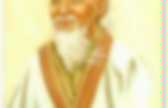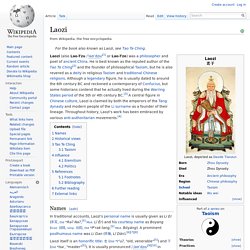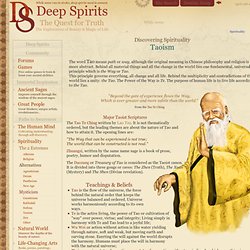

Lao tzu (laozi)
Laozi. Names[edit] In traditional accounts, Laozi's personal name is usually given as Li Er (李耳, Old *Rəʔ Nəʔ,[5] Mod.

Lǐ Ěr) and his courtesy name as Boyang (trad. 伯陽, simp. 伯阳, Old *Pˤrak-lang,[5] Mod. Bóyáng). Laozi itself is an honorific title: 老 (Old *rˤuʔ, "old, venerable"[5]) and 子 (Old *tsə′, "master"[5]). As a religious figure, he is worshipped under the name "Supreme Old Lord" (太上老君, Tàishàng Lǎojūn)[18] and as one of the "Three Pure Ones".
Historical views[edit] In the mid-twentieth century, a consensus emerged among scholars that the historicity of the person known as Laozi is doubtful and that the Tao Te Ching was "a compilation of Taoist sayings by many hands The third story in Sima Qian states that Laozi grew weary of the moral decay of life in Chengzhou and noted the kingdom's decline. Depiction of Laozi in E.T.C. A seventh-century work, the Sandong Zhunang ("Pearly Bag of the Three Caverns"), embellished the relationship between Laozi and Yinxi. Tao Te Ching[edit] Taoism[edit] Lao Tzu (Laozi) » Wisdom of the Ancient Sages « Articles & Wisdom. Lao Tzu (Laozi) Wisdom of the Ancient Sages The Old Master An Introduction to Lao Tzu Two and a half millennia ago, in ancient China two great contemporary philosophers and holy men, Confucius and Lao Tzu, attempted to reform and improve the way people lived. Lao Tzu was not only a philosopher but a personality worshiped as a prophet or divinity.
Lao Tzu presented his philosophy in the Tao Te Ching , which, next to the Bible, is the most translated book in the world. The Story of His Life Lao Tzu (The Old Master), also know as Lao Tse, Lao Tsu or Lao Zi, is a personality clouded by doubt and historical uncertainty, as far as facts about his life are concerned. During the Han dynasty (206-220 BC), a historian named Ssu-ma Ch'ien created Lao Tzu's first biography. Also legendary is the account of Lao Tzu's voyage to the west and the way he wrote his book " Tao Te Ching ". Back to Top Legends Lao Tzu was also connected to the Buddha. Tao Te Ching Conclusion. Armies » Tao Te Ching « Ancient Words of Wisdom. Taoism. The word Tao means path or way, although the original meaning in Chinese philosophy and religion is more abstract.

Behind all material things and all the change in the world lies one fundamental, universal principle which is the Way or Tao. This principle governs everything, all change and all life. Behind the multiplicity and contradictions of the world lies a unity: the Tao. The Power of the Way is Te. The purpose of human life is to live life according to the Tao. "Beyond the gate of experience flows the Way, Which is ever greater and more subtle than the world.
" From the Tao Te Ching Major Taoist Scriptures The Tao Te Ching written by Lao Tzu. "The Way that can be experienced is not true; The world that can be constructed is not real. " Zhuangzi, written by the same name sage is a book of prose, poetry, humor and disputation. The Daozang or Treasury of Tao is considered as the Taoist canon. Teachings & Beliefs P'u is a passive state of receptiveness, state of perception without prejudice.